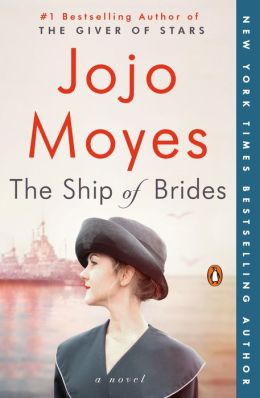The Ship of Brides. Jojo Moyes. 2005/2014. Penguin. 464 pages.
Did I love absolutely everything about Jojo Moyes' The Ship of Brides? No, I can't say that I did. But I enjoyed it enough to read it in two days. I'll start with what I loved.
I loved the subject. I loved the idea of reading about a group of women--war brides--sailing together into the unknown. The book is about a ship full of Australian women--all war brides--sailing to England in 1946. It isn't any ship either. It's an aircraft carrier. The potential to mingle with the navy is definitely there, though obviously discouraged. There are over 600 women on board, though readers only get close to four women who share a room: Jean, Avice, Margaret, and Frances. They are sailing into the unknown in a way because they've never been to England, they've never met their in-laws, and they haven't seen their husbands in months or even years. Take into consideration, that some of these couples only knew each other a few weeks before they got married, and, yes there is plenty of unknown ahead. Even if they felt like they *knew* their husbands when they got married, they don't know how the war has changed them, if the war has changed them. The time on the ship is an in-between time: the first taste of a big change in all their lives. Will they be happy? Will it all work out? Are they still loved? Are they still wanted? Several women receive messages--telegrams, I believe-telling them NOT to come.
I liked the narration, especially of the time on the ship. The days/weeks are chronicled, and, one gets a sense of the experience, of the journey. The anxiety, the awkwardness, the heat, the opportunities, the stresses, etc. I thought the setting was well done, for the most part.
Did I love the characterization? Not as much as I hoped initially. I don't know if there was any one character that I loved. And some of the characterization felt a bit uneven.
What I didn't quite love was the framework. The beginning and ending felt a little off to me. Readers first meet a grandmother and a granddaughter on their trip in India. The two just happen to stumble upon a ship about to become scrap. It is THE ship, and it overwhelms the grandmother to see it. The rest of the book is about the four women--really, just three women if I'm honest--and tries, I suppose, to keep readers guessing which of the three is the grandmother of the future. The ending is part of that framework: readers finally knowing how it all fits together.
I liked it. I'm glad I read it. I am. I'm interested in the subject. I would be happy to read more books like it. But it wasn't love for me.

No comments:
Post a Comment